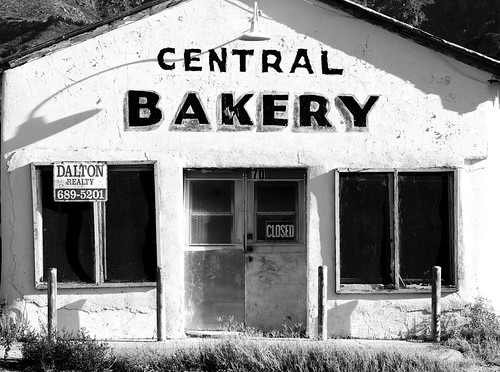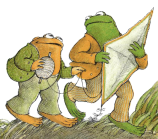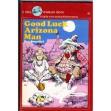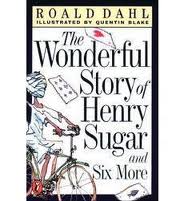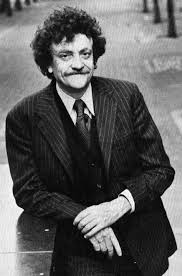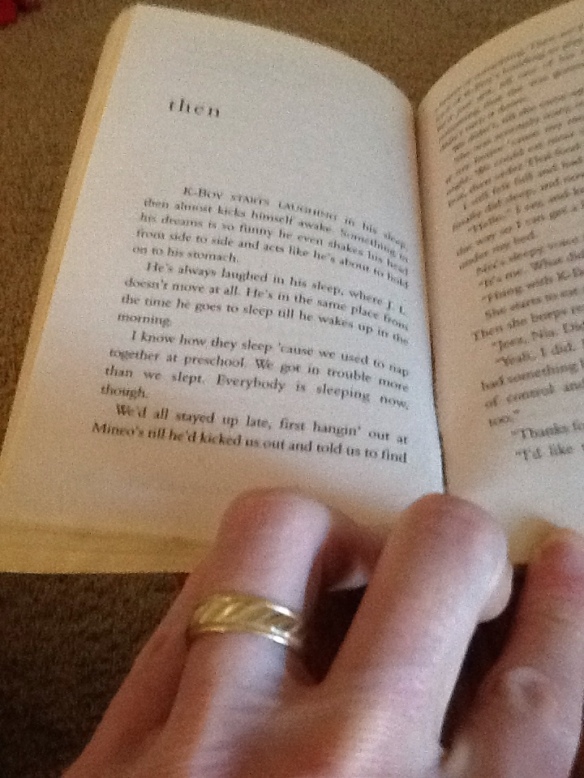At last Jessie opened her eyes. It was morning, but the sun was covered by clouds. The color of the sky was like a giant bruise. She sat up and looked all around her. It seemed like night because it was so, so dark. Suddenly it began to thunder, and she saw that it was really going to rain.

“PSM V47 D661 Fracto nimbus advance clouds of a thunderstorm” by Unknown. Hover on photo for details.
“What shall we do? Where shall we go?” thought Jessie.
The wind was blowing more and more clouds across the sky, and the lightning was very near.
She walked a little way into the wood, looking for a place to go out of the rain.
“Where shall we go?” she thought again.
Then she saw something ahead of her in the woods. It was an old boxcar.
“What a good house that will be in the rain!” she thought.
She ran over to the boxcar. There was no engine, and the track was old and rusty. It was covered with grass and bushes because it had not been used for a long time.
“It is a boxcar,” Jessie said. “We can get into it and stay until it stops raining.”
She ran back as fast as she could to the other children. The sky was black, and the wind was blowing very hard.
“Hurry! Hurry!” cried Jessie. “I have found a good and safe place! Hurry as fast as you can!”
Henry took Benny’s hand, and they all ran through the woods after Jessie. Violet trailed the group to make sure nothing followed them.
“It’s beginning to rain!” cried Henry.
“We’ll soon be there,” Jessie shouted back. “It is not far. When we get there, you must help me open the door. It is heavy.”
The stump of a big tree stood under the door of the boxcar. There looked to be blood on it. It bothered the children none at all. They had seen more blood than that for free with their breakfast cereal. Jessie and Henry jumped up on the old stump and rolled back the heavy door of the car. Henry looked in. No one looked to be home.
“There is nothing in here,” he said. “Come, Benny. We’ll help you up.”
Violet popped in next, and, last of all, Jessie and Henry climbed in.
They were just in time. How the wind did blow! They rolled the door shut, and then it really began to rain. Oh, how it did rain! It just rained and rained.
Violet looked through the slats of the boxcar’s side. Her eyes grew wide.
“Look!” she said. “Look . . . the undead!”
Two zombies were stumbling toward the boxcar. One might have been a farmer at one time. He wore ragged overalls. The other might have been a businessman. He still wore a tie.
“What will we do? What will we do?” cried Jessie.
“We will stay quiet and stay in here and see what happens,” said Henry. They all crouched low.
At there very moment, a crack of lightning and thunder loudly burst over there heads. It made the children jump a bit and Benny shrieked until Violet popped a hand over his mouth.
The lightning made the zombies look straight up. And they continued to look straight up. They looked straight up into the pouring rain for five, then ten, then fifteen minutes. At seventeen minutes they both fell over. Even in the pounding rain, they could be heard gurgling.
“They are water logged!” Henry cried. “They can’t drown, but they are too heavy from drinking in the pouring rain! Stupid zombies!”
Before anyone could say more, Violet had pushed open the boxcar door and found a railroad spike in the mud. Thirty seconds later, the undead had been made completely dead by a 10-year-old girl. After her assault, Violet stood in the rain to wash the gore off her clothes.
The other children remained in the boxcar with their mouths open. Violet returned.
“What a good place this is!” Violet said. “This boxcar is just like a warm little house with one room.”
After awhile the rain and lightning and thunder stopped, and the wind did not blow so hard. Then Henry opened the door and looked out. Yep, the two zombies were now permanently out of commission, he thought. All the children looked out into woods. The sun was shining, but some water still fell from the trees. In front of the boxcar was a pretty little brook ran out the rocks, with a waterfall in it.
After Henry and Jessie dragged the now very dead farmer and businessman deeper into the woods to rot, the children all gathered near the boxcar.
“What a beautiful place!” said Violet. “And if they come in ones and twos at a time, I can take them!
“Henry,” cried Jessie. “Let’s live here!”
“Live here?” asked Henry. He was a pretty boy, but a little slow.
“Yes! Why not?” said Jessie. “This boxcar is a fine little house. It is dry and warm in the rain.”
“We could wash in the brook,” said Violet.
“Please, Henry,” said Jessie. “We could have the nicest little home here, and we could find some dishes, and make four beds and a table, and maybe chairs.”
“No,” said Benny. “I don’t want to live here, Jessie.”
“Oh, dear, why not, Benny?” asked Jessie.
“I’m afraid the engine will come and take us away,” answered Benny.
Henry and Jessie laughed. “Oh, no, Benny,” said Henry. “The engine will never take this car away. It is an old, old, car, and grass and bushes are growing all over the track.”
“Then doesn’t the engine use this track anymore?” asked Benny. “There must be a few train engineers left in the world.”
“They don’t use the track anymore. I don’t know about the engineers,” said Henry. He was beginning to want to live in the boxcar, too. “We’ll stay here today, anyway.”
“Then can I have my dinner here?” asked Benny.
“Yes, you shall have dinner now,” said Henry.
So Jessie took out the last loaf of bread and cut it into four pieces, but it was very dry. Benny ate the bread, but soon began to cry.
“I want some milk, too, Jessie,” he begged.
“He ought to have milk,” said Henry. “I’ll go to the next town and get some.”
But Henry did not want to start. He looked to see how much money he had. Then he stood thinking.
At last he said, “I don’t want to leave you girls alone.”
“Oh,” said Jessie, “We’ll be all right, Henry. We’ll have a surprise for you when you come back. You just wait and see!”
“Good-by, Henry,” said Benny.
So Henry walked off through the woods.
When he had gone, Jessie said, “Now, children, what do you think we are going to do? What do you think I saw over in the wood? I saw some blueberries!”
“Oh, oh!” cried Benny. “I know what blueberries are. Can we have blueberries and milk, Jessie?
“Yes,” Jessie was beginning. But she suddenly stopped, for she heard a noise. Crack, crack, crack! Something was in the woods.
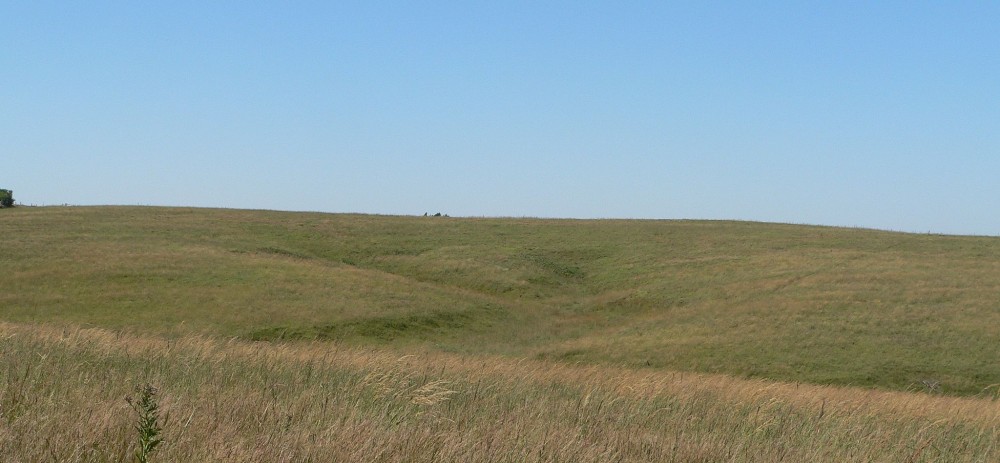
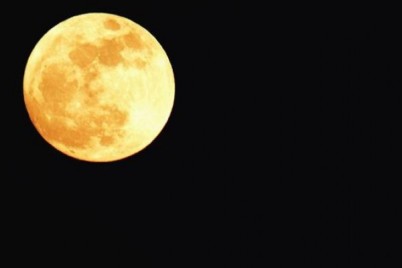
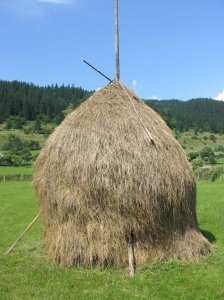
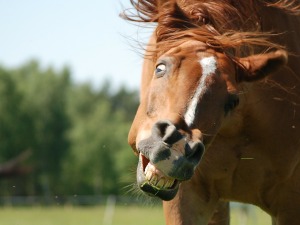 It was driven by a zombie couple. The horse also looked dazed. He had a bleeding bite mark on his flank.
It was driven by a zombie couple. The horse also looked dazed. He had a bleeding bite mark on his flank.